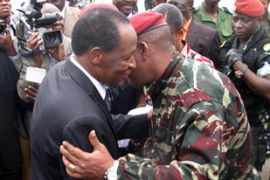Guinea run-off on September 19
Politicians agree to hold presidential run-off after Islamic holy month.

A presidental source said the run-off vote had been delayed until after “the end of Ramadan”, the Islamic holy month.
Ending dictatorship
|
“The postponement of the second round benefits the transitional government which wants to stay in power foreever” Ismael Bangoura, political analyst |
Diallo, who secured 44 per cent of the votes in the first round, has won backing from the third place finisher, Sidya Toure, who garnered 14 per cent.
Conde, who took 18 per cent of ballots, has teamed up with Lansana Kouyate who finished fourth with seven per cent.
The country is currently being run by a transitional government with General Sekouba Konate, a military leader, holding the presidency and Jean-Marie Dore acting as prime minister.
“The postponement of the second round benefits the transitional government which wants to stay in power forever,” Ismael Bangoura, a Guinean political analyst, said.
Jean-Marie Dore had said the date for the second round was less important than the vote’s “credibility”.
‘Stolen votes’
Several candidates, including Conde and Toure, had accused the national electoral commission of having “stolen” thousands of votes in the first round.
The date for the second round of voting was set after Blaise Compaore, president of Burkina Faso, and Senegal’s Abdoulaye Wade paid seperate visits to Guinea over the past week to urge politicans to agree on a date.
| IN DEPTH |
|
|
|
|
More than 4.2 million Guineans registered to vote in the country’s first free election since independence, including more than 112,000 in 17 foreign countries in Africa, Europe and the US.
Guinea gained independence from France in 1958 and has since been ruled by a succession of civilian and military dictators.
While the country is poor, Guinea is the world’s top bauxite producer, a mineral needed to produce aluminum, and also holds significant deposits of diamonds, gold and iron ore.
The run-off vote comes after a military government led by Moussa ‘Dadis’ Camara gained international notoriety in September 2009 after army units opened fire on pro-democracy demonstrators gathered in a Conakry stadium.
Violent history
Security forces massacred more than 150 people, wounded 1,000 others and raped some 100 women.
That carnage acted as a turning point in the country’s turbulent history.
In December 2009, Camara was shot by an aide. He survived but was forced into exile as part of a tenuous peace deal.
General Konate, Camara’s deputy, appointed a civilian prime minister and established a civilian-led transitional governing council, paving the way for a new constitution and the elections in June.

